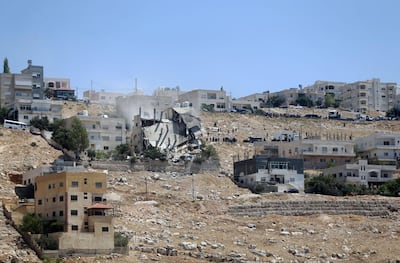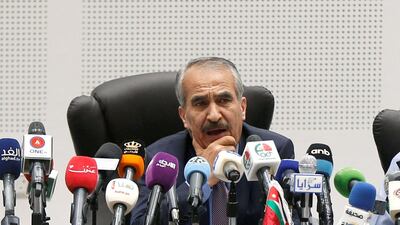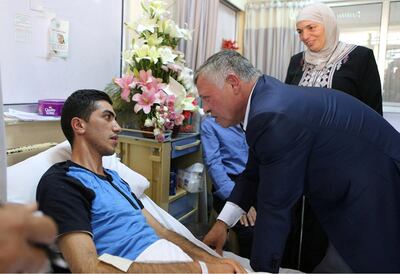Militants who killed five members of the Jordanian security forces since Friday were all Jordanian nationals who sympathised with ISIS but had no known foreign links and were planning a string of further attacks, government officials said on Monday.
At a press conference to unveil the initial results of the ongoing investigation, Interior Minister Sameer Al Mobaideen said inquiries had found that the cell of Jordanian men, inspired by ISIS but with no known organisational ties to the group, carried out the bomb attack on a police squad car on Friday. The explosion near a music concert in the Christian village of Fuheis killed one officer and wounded six others.
During a huge security operation to capture the perpetrators, police tracked down the cell to an apartment complex in the town of Salt some 20 kilometres west of Amman. As officers moved in to search the block, the cell opened fire then set off a series of explosions that brought down part of the block. Four members of the armed forces were killed in the firefight and another 10 were wounded. A similar number of civilians were also injured, Mr Al Mobaideen said. Much of the town remains behind a security cordon with police sweeping for more explosives and additional potential accomplices.
There were more in explosions in Salt on Monday evening, which government spokeswoman Jumana Ghunaimat said were part of the ongoing sweep of the cell's hideout and the surrounding area by specialised teams.

The raid on the apartment in Salt was carried out after intelligence revealed that the cell was preparing “imminent” attacks, the minister said.
Mr Al Mobaideen added that the terrorists had planted explosives deep within the apartment so that as the first team of special forces completed their initial sweep of the building, the cell detonated the device in a bid to trap the officers under the debris.
The raid uncovered what Ms Ghunaimat described as “a large and terrifying amount” of prepared IEDs, in addition to explosive materials and wires.
"There were plots to wage a series of terror attacks that sought security points and popular gatherings. We know the targets but we won't tell them so people won't get terrified," Al Mobaideen said.
The cell’s stock of explosives would have allowed them to carry out attacks across the country over an extended period of time, the minister added.
Alongside automatic weapons in the suspects' possession, the authorities found a location where chemicals for manufacturing explosives were buried, Mr Al Mobaideen told reporters.
The explosives "were ready, on timer, and could be detonated immediately", Ms Ghunaimat told reporters.
“We in Jordan are in an open battle with terrorists,” Ms Ghunaimat said at the press conference in Amman on Monday. “This incident is part of the ongoing struggle against terrorism.”
Unlike previous attacks carried out in the kingdom by ISIS elements over the past few years, the cell of eight men had no organisational ties to ISIS or any other extremist group. According to security officials, the state had no prior police record or indications that the men had sympathies with extremist groups.
"The information gained from security services is that this is a new cell," Maj Gen Hussein Hawatmeh, general director of the Jordanian gendarmerie forces, said at the press conference. "This cell was formed not a long time ago and they were persons who only recently carried takfiri ideology."
______________
Jordanian terror cell:
Jordan minister says terror cell who attacked police support ISIS
Four officers dead, five militants in custody after Jordanian apartment raid
Two Jordanian security officers killed in attacks near Amman
______________
The revelations are in line with a growing trend of what terrorism experts call a “decentralised ISIS”, autonomous members carrying out revenge attacks in the group’s name with little or no co-ordination from the extremist group’s central command.
Under such a scenario, rather than a direct spillover from the Syrian or Iraqi conflict, or the return of dozens of Jordanian ISIS fighters, the threat comes from the formation of amateur ISIS supporters cells. As such, they are not under security surveillance and their social media activity and statements do not immediately link them to the militant group who once held sway over large areas of Syria – some abutting the Jordanian border.
They pose a new challenge to Jordanian authorities and pose a greater threat to the kingdom than centrally directed cells with known ISIS members.
Intelligence officials and some experts believe widening social disparities and a perception of official corruption are fuelling a rise in radicalisation among disaffected youths in a country with high unemployment and growing poverty.
On Monday, King Abdullah visited the mourning tents to pay his respects to the families of Maj Muath Khamis Al Huwaitat in southern Jordan and Cpl Hisham Al Aqarbeh of the General Intelligence Directorate’s Anti-Terror Unit in northern Jordan, two of the four security service members killed by the cell at the weekend.

Sgt Ali Adnan Qawqaza of Jordan’s Gendarmerie force was killed in a bombing Friday near the Christian village of Fuheis, just 12 kilometres from Amman. As well as Maj Al Huwaitat and Cpl Al Aqarbeh, who were killed during the raid on the Salt apartment, Cpl Mohammed Al Hayajneh and Cpl Muhammad Al Bani Yassin of the Jordan Armed Forces also lost their lives in the firefight.
The monarch, who has vowed that Jordan will “strike [terrorists] mercilessly with all force and determination”, and that the attacks have only strengthened the country’s resolve to “eradicate terrorism”, spent Sunday visiting those injured in the attacks.
Minister Mobaideen confirmed the weekend's toll, saying that security forces had killed three terrorists in the shootout and arrested five.
The attack in Fuheis was carried out with an explosive device planted by the terrorists at a security checkpoint prior to the squad car’s arrival and detonated by remote control. The car was carrying police and Gendarmerie forces who were monitoring and protecting a music festival attended by thousands less than 1km away.


